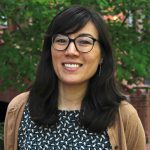
This Conference Report was provided by Nicole Ferraiolo, Program Officer for Scholarly Resources at the Council on Library and Information Resources, DLF’s parent organization.
In 1906 Danish philologist and historian Johan Heiberg discovered that hidden beneath the script of a 13th c. prayer book was a long lost text by the Ancient Greek mathematician Archimedes. Heiberg went on to photograph, transcribe, and publish the text of the Archimedes Palimpsest, making it available to people around the world. A century later, Dr. Will Noel and his team developed creative solutions to image the Palimpsest, before transcribing it, digitally encoding it, creating metadata, and uncovering more lost work along the way. Like Heiberg before him, Noel took this rare text and made it exponentially more available. However, accessibility means something very different in the 21st century than it did in the early 20th. Both scholars published their transcriptions and analyses, but Noel was equipped with the tools and the ideals of openness common in the information age. For Noel, availability meant making both the images and raw data free for anyone with access to a computer. It meant exposing new people to the work through popular educational resources, like TED talks and Wikipedia pages.
This tale of two scholars, separated by a century, kicked off the first ever Advancing Research Communication and Scholarship (ARCS) conference in Philadelphia, PA April 26–28, 2015. Will Noel, the Director of the Schoenberg Institute for Manuscript Studies at the University of Pennsylvania, gave an inspiring opening keynote that demonstrated what could be accomplished by working across institutional boundaries and opening up one’s data. At the same time, his story illustrated what the audience already knew all too well: that the world of scholarly communications is in a period of radical transformation.
In the sessions that followed, stakeholders from diverse institutions and fields discussed the changing landscape of scholarly communication from a variety of angles. Questions were high stakes and did not have clear-cut answers: What is the future of publishing and peer review? Of metrics and assessment? What’s the role of open access? The publishing industry? What are the global implications? And what does all this mean for the individual researcher?
Many of the panelists at ARCS were early-career scholars who were eager to share stories about how this changing ecosystem affects both their research and career trajectories. On the datalogical narratives panel, one scholar in the humanities shared the challenges of doing research at an institution that cannot afford access to the repositories necessary for her work, and the incentives to turn to the “gray market,” such as, borrowing library login information from friends whose institutions do subscribe. A scholar in the sciences lamented that she was advised against including altmetrics on her CV, even though universities are increasingly using them to assess her scholarship. At the same time, there were encouraging signs from universities who felt that in order to promote a new culture of scholarly communications, it would be critical to reach the next generation of researchers. Rutgers and Stanford, for instance, have passed open access policies, which promote free and open access to scholarship from their institutions.
[pullquote2 quotes=”true” align=”right” variation=”steelblue”]What are the global implications? And what does all this mean for the individual researcher?[/pullquote2]
Other sessions considered the global implications of this changing landscape. At the Beyond Open panel, Stanford Professor John Willinsky asked the audience to question whether the journal itself was an imperial form and advocated for a model where under-resourced institutions around the world could have access to the tools to become their own centers for digital information. Jane Anderson from NYU also called for local control of the dissemination of information, though in this case, regarding intellectual property and protection of indigenous peoples through Traditional Knowledge (TK) licenses. Following, Mónica Feliú-Mójer, the vice-director of Ciencia Puerto Rico, and ARCS’ closing keynote speaker, advocated for increasing access to research by moving past paywalls and improving communication with the broader public through free and compelling educational resources.
ARCS had no shortage of open access advocates, but this didn’t mean there weren’t questions or conflicting visions for its future. Disparate parties presented new models for open access journals and repositories, often competing with each other to accomplish shared goals. Meanwhile, several panels dealt with the issues of the cost and sustainability for open access, inviting publishers, librarians, and advocates to sit at the same table to identify stakeholders and consider possible models.
Whether or not we like it, the world of research communication is changing and we will never return to the scholarly landscape of 1906, or even 1996. In the Q&A following his keynote, Will Noel said that we should collaborate, digitize, and make things accessible because we should. But how do we do this while producing new work, scaling globally, protecting vulnerable populations, and staying employed (not to mention tenure!)? The answers are not easy or unanimous, but after attending ARCS, I’m confident they’re out there. That said, if we truly want to advance research communication and scholarship it’s going to take a lot longer than a year… I’ll keep an eye out for #ARCS2016.
